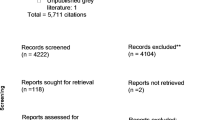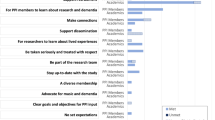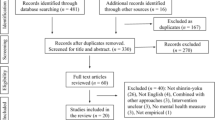Abstract
Tai chi/qigong (TCQ) is a low impact, meditative movement with breathwork that may benefit people with HIV (PWH) over 50 years old. This study is a feasibility clinical trial of a remote TCQ intervention for older PWH. Participants (n = 48) were recruited via clinic sites and social media and randomized to a TCQ, sham qigong, or wait-list control group. The 12-week intervention included fourteen 45–60-minute sessions. Acceptability (satisfaction, attitudes, practice, attendance) and feasibility (retention rate, adverse events, remote delivery) data were surveyed. Overall retention rate was 72.9%, but 81.2% for the TCQ group. Most TCQ participants attended at least 10 sessions (62.5%) and were practicing TCQ after 2 weeks (72.7%). Over 92% of TCQ participants reported satisfaction and positive attitudes and preferred remote versus in person delivery (63.6%). Two mild intervention related adverse events occurred. Findings suggest that a remote TCQ intervention is acceptable, feasible, and safe among older PWH.
Resumen
Tai chi/qigong (TCQ) es un movimiento meditativo de bajo impacto con ejercicios de respiración que puede beneficiar personas que viven con VIH (PVV) mayores de 50 años. Este estudio es un ensayo clínico de viabilidad que evalúa una intervención de TCQ administrada remotamente para personas mayores que viven con VIH. Participaron personas (n = 48) reclutadas en clínicas y redes sociales, asignadas aleatoriamente a un grupo de TCQ, qigong falso, o control en lista de espera. La intervención duró 12 semanas con catorce sesiones de 45 a 60 minutos. Se encuestaron datos sobre aceptabilidad (satisfacción, actitudes, práctica, asistencia) y viabilidad (retención, eventos adversos, entrega remota). La tasa de retención general fue del 72,9%, pero del 81,2% para el grupo de TCQ. La mayoría de los participantes de TCQ asistieron a al menos 10 sesiones (62,5%) y continuaron practicando después de 2 semanas (72,7%). La satisfacción y las actitudes positivas hacia la intervención fueron reportadas por más del 92% de los participantes de TCQ quienes prefirieron la participación remota contra clases en persona (63,6%). Dos eventos adversos leves relacionados con la intervención ocurrieron. Los resultados sugieren que una intervención de TCQ administrada de forma remota es aceptable, viable y seguro para personas mayores que viven con VIH.

Similar content being viewed by others
References
Centers for Disease Control and Prevention, Surveillance Report HIV. 2020, Volume 33. 2022. Available at: http://www.cdc.gov/hiv/library/reports/hiv-surveillance.html. Accessed 9 August 2022.
Wing EJ. The aging population with HIV infection. Trans Am Clin Climatol Assoc. 2017;128:131–44.
Ahmed S, Algarin AB, Thadar H, Zhou Z, Taskin T, Vaddiparti K, Villalba K, Wang Y, Ennis N, Morano JP, Somboonwit C, Cook RL, Ibañez GE. Comorbidities among persons living with HIV (PWH) in Florida: a network analysis. AIDS Care. 2022. https://doi.org/10.1080/09540121.2022.2038363.
Frain J. Considering the impact of aging when caring for and treating adults with HIV. J Gerontol Nurs. 2020;46(4):31–40. https://doi.org/10.3928/00989134-20200304-02.
Sabin CA, Harding R, Bagkeris E, et al. Pain in people living with HIV and its association with healthcare resource use, well-being, and functional status. AIDS. 2018;32(18):2697–706. https://doi.org/10.1097/QAD.0000000000002021.
Kooij KW, Wit FW, Schouten J, et al. HIV infection is independently associated with frailty in middle-aged HIV type 1-infected individuals compared with similar but uninfected controls. AIDS. 2016;30(2):241–50. https://doi.org/10.1097/QAD.0000000000000910.
Olson B, Vincent W, Meyer JP, et al. Depressive symptoms, physical symptoms, and health-related quality of life among older adults with HIV. Qual life research: Int J Qual life aspects Treat care rehabilitation. 2019;28(12):3313–22. https://doi.org/10.1007/s11136-019-02271-0.
Bhochhibhoya A, Harrison S, Yonce S, Friedman DB, Ghimire PS, Li X. A systematic review of psychosocial interventions for older adults living with HIV. AIDS Care. 2020;33(8):971–82. https://doi.org/10.1080/09540121.2020.1856319.
Jahnke RA. The healing promise of Qi: creating extraordinary wellness through qigong and tai chi. New York: McGraw-Hill; 2022.
Larkey L, Jahnke R, Etnier J, Gonzalez J. Meditative Movement as a category of exercise: implications for research. J Phys Activity Health. 2009;6(2):230–8. https://doi.org/10.1123/jpah.6.2.230.
Ibañez GE, Hu N, Huertas L, Lembo M. Preliminary efficacy of a Tai Chi/Qigong intervention for mental health among older people living with HIV. Poster presented at: American Public Health Association Conference; November 2022.
Lavretsky H, Milillo MM, Kilpatrick L, Grzenda A, Wu P, Nguyen SA, Ercoli LM, Siddarth P. A randomized controlled trial of tai chi chih or health education for geriatric depression. Am J Geriatric Psychiatry. 2022;30(3):392–403. https://doi.org/10.1016/j.jagp.2021.07.008.
Zhang P, Li Z, Yang Q, Zhou J, Ma X. Effects of Taijiquan and Qigong exercises on depression and anxiety levels in patients with substance use disorders: a systematic review and meta-analysis. Sports Med Health Sci. 2021;4(2):85–94. https://doi.org/10.1016/j.smhs.2021.12.004.
Gomaa S, West C, Lopez AM, Zhan T, Schnoll M, Abu-Khalaf M, Newberg A, Wen K. A telehealth-delivered Tai Chi intervention (TaiChi4Joint) for managing aromatase inhibitor-induced arthralgia in patients with breast cancer during COVID-19: longitudinal pilot study. JMIR formative research. 2022;6(6):e34995. https://doi.org/10.2196/34995.
Larkey LK, Roe DJ, Weihs KL, et al. Randomized controlled trial of Qigong/Tai chi easy on cancer-related fatigue in breast cancer survivors. Ann Behav Med. 2015;49(2):165–76. https://doi.org/10.1007/s12160-014-9645-4.
Li F, Harmer P, Fitzgerald K, Winters-Stone K. A cognitively enhanced online Tai Ji Quan training intervention for community-dwelling older adults with mild cognitive impairment: a feasibility trial. BMC Geriatr. 2022;22(6). https://doi.org/10.1186/s12877-021-02747-0.
Ni X, Chan RJ, Yates P, Hu W, Huang X, Lou Y. The effects of Tai Chi on quality of life of cancer survivors: a systematic review and meta-analysis. Support Care Cancer. 2019;27:3701–16. https://doi.org/10.1007/s00520-019-04911-0.
Pan X, Tian L, Yang F, Sun J, Li X, An N, Xing Y. Tai Chi as a Therapy of Traditional Chinese Medicine on Reducing Blood Pressure: A Systematic Review of Randomized Controlled Trials. Evidence-based Complementary and Alternative Medicine. 2021; 2021. https://doi.org/10.1155/2021/4094325.
Taylor-Piliae R, Finley BA. Benefits of Tai Chi Exercise among adults with Chronic Heart failure: a systematic review and Meta-analysis. J Cardiovasc Nurs. 2020;35(5):423–34. https://doi.org/10.1097/JCN.0000000000000703.
Taylor-Piliae RE, Finley BA. Tai Chi exercise for psychological well-being among adults with cardiovascular disease: a systematic review and meta-analysis. Eur J Cardiovasc Nurs. 2020;19(7):580–91. https://doi.org/10.1177/1474515120926068.
Yang G, Li W, Klupp N, Cao H, Liu J, Bensoussan A, Kiat H, Karamacoska D, Chang D. Does tai chi improve psychological well-being and quality of life in patients with cardiovascular disease and/or cardiovascular risk factors? A systematic review. BMC Complement Med Ther. 2022;22(3). https://doi.org/10.1186/s12906-021-03482-0.
Lin R, Cui S, Yang J, Yang H, Feng Z, Wahner-Roedler DL, Xu M. Effects of Tai Chi on Patients with Mild Cognitive Impairment: A Systematic Review and Meta-analysis of Randomized Controlled Trials. Biomed Research International. 2021; 2021. https://doi.org/10.1155/2021/5530149.
Wang X, Wu J, Ye M, Wang L, Zheng G. Effect of Baduanjin exercise on the cognitive function of middle-aged and older adults: a systematic review and meta-analysis. Complement Ther Med. 2021;59:102727. https://doi.org/10.1016/j.ctim.2021.102727.
Wang Y, Zhang Q, Li F, Li Q, Jin Y. Effects of tai chi and Qigong on cognition in neurological disorders: a systematic review and meta-analysis. Geriatr Nurs. 2022;46:166–77. https://doi.org/10.1016/j.gerinurse.2022.05.014.
Yang J, Zhang L, Tang Q, Wang F, Li Y, Peng H, Wang S. Tai Chi is Effective in Delaying Cognitive Decline in Older Adults with Mild Cognitive Impairment: Evidence from a Systematic Review and Meta-Analysis. Evidence-based Complementary and Alternative Medicine. 2020; 2020. https://doi.org/10.1155/2020/3620534.
Moore AA, Lake JE, Glasner S, Karlamangla A, Kuerbis A, Preciado D, Jenkins J, Dominguez BX, Candelario J, Liao DH, Tang L, Reid MC. Establishing the feasibility, acceptability, and preliminary efficacy of a multi-component behavioral intervention to reduce pain and substance use and improve physical performance in older persons living with HIV. J Subst Abuse Treat. 2019;100:29–38. https://doi.org/10.1016/j.jsat.2019.02.003.
You T, Koren Y, Butts WJ, Moraes CA, Yeh GY, Wayne PM, Leveille SG. (2023). Pilot studies of recruitment and feasibility of remote Tai Chi in racially diverse older adults with multisite pain. Contemporary Clinical Trials. 2023; 128. https://doi.org/10.1016/j.cct.2023.107164.
Smith E, Badowski ME. Telemedicine for HIV Care: current status and future prospects. HIV/AIDS. 2021;13:651–6. https://doi.org/10.2147/HIV.S277893.
Jahnke RA, Larkey LK, Rogers C. Dissemination and benefits of a replicable Tai Chi and Qigong program for older adults. Geriatr Nurs. 2010;31(4):272–80. https://doi.org/10.1016/j.gerinurse.2010.04.012.
Larkey LK, Roe DJ, Smith L, Millstine D. Exploratory outcome assessment of Qigong/Tai Chi Easy on breast cancer survivors. Complement Ther Med. 2016;29:196–203. https://doi.org/10.1016/j.ctim.2016.10.006.
Bowen DJ, Kreuter M, Spring B, Cofta-Woerpel L, Linnan L, Weiner D, Bakken S, Kaplan CP, Squiers L, Fabrizio C, Fernandez M. How we design feasibility studies. Am J Prev Med. 2009;36(5):452–7. https://doi.org/10.1016/j.amepre.
Gibbons LE, Fredericksen R, Batey DS, Dant L, Edwards TC, Mayer KH, Crane PK. Validity assessment of the PROMIS fatigue domain among people living with HIV. AIDS Res Therapy. 2017;14(21). https://doi.org/10.1186/s12981-017-0146-y.
Voss JG, Barroso J, Wang TA, Critical Review of Symptom Management Nursing Science on HIV-Related Fatigue and Sleep Disturbance. Int J Environ Res Public Health. 2021;18(20):10685. https://doi.org/10.3390/ijerph182010685.
McCain NL, Gray DP, Elswick RK, Robins JW, Tuck I, Walter JM, Rausch SM, Ketchum JM. A randomized clinical trial of alternative stress management interventions in persons with HIV infection. J Consult Clin Psychol. 2008;76(3):431–41. https://doi.org/10.1037/0022-006X.76.3.431.
Ramirez-Garcia MP, Gagnon M, Colson S, Cote J, Flores-Aranda J, Dupont M. Mind-body practices for people living with HIV: a systematic scoping review. BMC Complement Altern Med. 2019;19(125). https://doi.org/10.1186/s12906-019-2502-z.
Acknowledgements
I would like to acknowledge our collaborators, Care Resources Community Health Centers, the Borinquen Healthcare Centers, Positive Connections, and Trialfacts; and Brenda Lerner, Thuy-Thuong Nguyen, and Galilea Mayorga. This work was funded by grant number R34 AT009966 from the National Center for Complementary and Integrative Health (NCCIH).
Author information
Authors and Affiliations
Corresponding author
Additional information
Publisher’s Note
Springer Nature remains neutral with regard to jurisdictional claims in published maps and institutional affiliations.
Rights and permissions
Springer Nature or its licensor (e.g. a society or other partner) holds exclusive rights to this article under a publishing agreement with the author(s) or other rightsholder(s); author self-archiving of the accepted manuscript version of this article is solely governed by the terms of such publishing agreement and applicable law.
About this article
Cite this article
Ibañez, G.E., Ahmed, S., Hu, N. et al. Acceptability and Feasibility of a Tai Chi/Qigong Intervention for Older People Living With HIV. AIDS Behav 28, 1291–1300 (2024). https://doi.org/10.1007/s10461-023-04158-1
Accepted:
Published:
Issue Date:
DOI: https://doi.org/10.1007/s10461-023-04158-1




